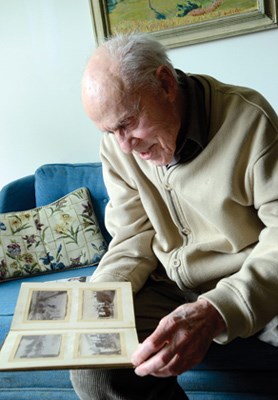DESMOND Power was almost seven when he ran away from home, fleeing the consequences of an unfortunate incident involving matches and a sofa.
Out on the dykes at the edge of the city of Tientsin, China, young Desmond appealed to a rickshaw driver to transport him far, far away.
Request denied. "Aren't you the grandson of 'lao tai-tai?' It would be more than my life is worth," he was told.
Desmond's grandmother, Agnes D'Arc, whose title translates loosely as "aged matriarch," was well-known.
"Even grandmother's mynah bird would suddenly screech out for the whole city to hear, "Lao tai-tai! Lao tai-tai!" Desmond remembers.
Desmond was born in 1923, the youngest child of the D'Arc's only daughter, Grace, and Stephen Power, an Irishman who had immigrated to find work in Tientsin's British concession on his brother's advice: "There's a living to be made out here."
Beginning in 1860 in Tientsin and in Shanghai as far back as 1842, the Chinese had assigned concession territories to most European countries. By the 1930s, the mix of cultures had produced a worldly, sophisticated society where theatre, art and music flourished as war drew nearer.
When the Second World War broke out on the other side of the world, Desmond enlisted in the local Volunteer Defense Corps. He was only 17 but the uniform got Desmond into nightclubs where he was introduced to hot jazz and swing performed by expatriate musicians like Earl Whaley.
By 1943, prison camps had been established in China by the Japanese. Black American musicians, who had found a haven from racism in the cosmopolitan environs of Shanghai and Tientsin, were not discriminated against by the Japanese, who interned them equally with the allied nationals.
The musicians brought the life-enhancing sounds of jazz and swing with them into the camps. Years later, Desmond remembers in his book, Little Foreign Devil, "What a godsend, that band, lifting the camp's morale as nothing else could."
At 20, Desmond entered Pootung, the first of three Japanese prison camps which would confine him for the duration of the war. The next camp, Lunghua, was a vast improvement, not least due to the humanitarian actions of the camp's Commandant Hayashi towards the prisoners.
Hayashi arranged for Desmond to be transferred to the Weihsien camp where he was reunited with his mother, half-brother and half-sister. There he became friends with another expat musician, guitarist Earl West and his wife, Deirdre. After liberation, Earl gave Desmond his resonant guitar, which he took with him to England and New Zealand.
In England, Desmond met and married Canadian Deborah Vass. The newlyweds immigrated to New Zealand in 1955 where Desmond designed and installed computer systems. They moved to Canada, settling in West Vancouver in 1960 and raising four children.
In demand all over North America for his expertise in new technology, Desmond found time to locate and connect fellow prison camp veterans by sharing research through the Old China Hands network.
One gratifying discovery was the daughter of Earl and Deirdre West, whom Desmond had known when she was a toddler in Weih-sien camp. In another case, a researcher had been using Desmond's online resources for some time before chance revealed they are both residents of West Vancouver.
In retirement, this third-generation China hand wrote his autobiography, Little Foreign Devil, and articles on things like the jazz scene and daily life in the prison camps, the experience of his D'Arc grandparents in the Boxer Uprising and the story of their internationally acclaimed marionette troupe. They're an eclectic portrayal of periods, places and events, the effects of which continue to exert their influence.
On Thursday, June 6, the anniversary of D-Day,
Tomohiko Hayashi, who helped Desmond and countless others, will be recognized in the Canadian Parliament with a statement of thanks for his efforts to save and preserve the lives of prisoners in Shanghai.
Desmond continues to write, most recently about his standoff with a bear on a daily walk. As the bear moved on to the home of Desmond's neighbours, a Chinese family, Desmond reverted to his mother tongue, alerting them in Mandarin about the gou-xiong.
Desmond Power's book and articles can be found on the website, Scribd.
Laura Anderson works with and for seniors on the North Shore. Contact her at 778-279-2275 or email her at [email protected].



